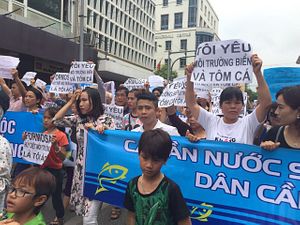Vietnamese officials and the Vietnamese people are waiting in anticipation to welcome U.S. President Barack Obama in about a week. But each have very different reasons for awaiting Obama’s visit.
The Vietnamese government will be laying out the red carpet for the leader of its former enemy, with whom it now seeks alliances with in order to improve its troubled economy and hedge security threats from neighboring China. Vietnam’s people, meanwhile, hope the leader of the United States can throw his weight behind concerns about government accountability and basic freedoms.
There will be a state dinner to welcome Obama, but if the president is wise he will stay away from eating fish. Vietnam is well-known for its many delicious fish dishes, but now the seafood could be poisoned, thanks to suspected chemical pollution from industrial companies.
Fish deaths were first reported on April 6 in Vung Ang. A total of four provinces along 200 kilometers (125 miles) of the central coast of Vietnam were affected throughout April and May. Millions of fish and marine life lay dead on the shore and at the bottom of the sea. Scientists attributed the fish deaths to toxic chemical poisoning. It has been over a month and officials have not announced the cause or source of the fish deaths. Coming to their own conclusions, the people of Vietnam no longer dare to eat any fish or seafood, even processed food like Vietnam’s specialty, fish sauce.
Public suspicion has centered on a steel plant run by Taiwanese-owned Formosa Plastics Group’s local branch, close to where the first fish deaths were reported. Most recently, local fisherman discovered the plant discharging yellow wastewater into the ocean from its steel plant.
Formosa has been globally ridiculed for its pollution, and was even given the “Black Planet Award” in 2009 from the Ethecon Foundation. Vietnamese officials have not implicated Formosa in the mass fish deaths, but a government investigation shows that the company had imported 384 tonnes of toxic chemicals within the past year. Furthermore, company spokesperson Chu Xuan Pham’s initial response to the fish death seemed to implicate the company. Pham explained in an interview to state media VTC14, “I cannot assure you that the activities of the steel factory would not impact marine life. You win some, you lose some […] You have to decide whether to catch fish and shrimp, or to build a modern steel industry. Even if you are the prime minister, you cannot choose both.”
The ocean water tests from local-level environmental organizations show that there are high levels of the heavy metal chromium and other chemicals like cyanide and ammonia. Scientists explain that these heavy metals and chemicals can penetrate your skin and, over time, cause bodily harm. Rather than be cautious, some officials have wanted to return to business as usual. On April 30, local officials in Ha Tinh and Da Nang went swimming and ate the seafood in restaurants near the beach to show that there is no more poison in the water. But fish have still shown up dead, and there has not been a systematic effort to clean up the toxic chemicals.
The Vietnamese people, in contrast to the officials, are asking to meet with Obama to candidly discuss the struggles of Vietnam. With the people, there is no need for ceremonial fanfare to distract from the realities on the ground. Vietnamese citizens are looking to express concerns regarding the lack of freedom and democracy as well as human rights violation.
In a quirk of timing, Obama will be arriving in Vietnam during the election for the National Assembly. The results in this “election” for the most part have been predetermined since the Party Congress earlier this year. Despite a movement beginning in February, where activists and civil society leaders attempted to run as independent candidates, all were eliminated out of the final roster of candidates. Prior to their elimination, many of these candidates were relentlessly harassed and ridiculed at state-sponsored town hall meetings. Some even had fermented shrimp sauce thrown on them as a means of intimidation, leading this election process to be dubbed “shrimp sauce democracy.”
The ecological crisis in the central coast of Vietnam is the latest instance testing the legitimacy of the government. Vietnamese officials have been slow to react even as people are getting sick, with one person dying. They have taken decisive action, however, against protesters. Heavy-handed suppression of peaceful demonstrators calling for a clean ocean and government have left many angry and questioning the intentions of the current authority. Is the Vietnamese Communist Party leading a government that is for the people, or for its own short-term gain?
The Vietnamese people hope Obama will stand with them in asking this question, even as the United States and Vietnam strengthens their comprehensive partnership.
Duyen Bui is a Ph.D candidate in political science at the University of Hawaii, Manoa, and a community activist.

































